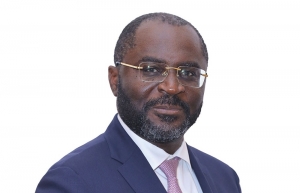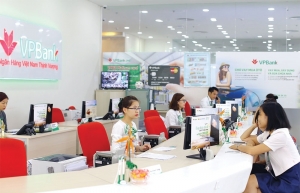Confidence on show in banks’ green shift
Tran Anh Quy, head of Policy Credit at the Credit for Economic Sectors Department of the State Bank of Vietnam (SBV), described the transformative wave of green growth strategy at a conference last week on green banking.
“There’s been a discernible paradigm shift in the banking system’s stance on green credit. We’ve diversified banking products and services to align with national green growth aspirations,” Quy said.
According to him, for the past five years, outstanding credit to green sectors from the banking system saw an impressive average annual growth rate exceeding 23 per cent.
Discussing the SBV’s focus, Quy said that among the 12 green sectors identified, renewable and clean energy attract the lion’s share of credit, comprising 45 per cent, with sustainable agriculture trailing at 31 per cent.
 |
| Confidence on show in banks’ green shift, illustration photo/ Source: Shutterstock |
Elaborating on green banking initiatives at Agribank, Nguyen Thi Thu Ha, deputy head of the Permanent ESG Steering Committee, stated, “The bank is in the process of refining its regulations and internal guidelines to align with green growth objectives. We’re enhancing international collaboration to promote related resources, digitising our operations for sustainable banking practices, and fostering human resources to realise the national strategy on green growth.”
Moreover, Agribank is stepping up its communication efforts regarding the banking sector’s role in fostering green growth and addressing climate change. It is taking a proactive stance in participating in forums centred on green finance, outlining key tasks and solutions, and ensuring a structured deployment at every organisational level.
HDBank is also making strides in bolstering green credit growth. Tran Hoai Phuong, its director of Corporate Clients, said that the bank emphasises policies that spur green credit growth for both established and emerging enterprises.
“These policies primarily target companies involved in large-scale solar and wind projects. Also, credit programmes are being launched for individual customers who wish to install solar panels for their household needs, business operations, and electricity sales,” Phuong revealed.
Furthermore, HDBank is striving to increase its green credit limits from development financial institutions, ensuring optimal use to best support enterprises under the green finance category.
From an international banking perspective, Standard Chartered remains committed to sustainability.
Michele Wee, CEO of Standard Chartered Bank (Vietnam), said, “The bank’s pledge to the Vietnamese market is to encourage sustainable agendas and assist our partners and allies in achieving their own sustainable objectives. Our commitment to sustainability dovetails with Vietnam’s strategic priorities.”
Standard Chartered has set ambitious goals, such as achieving net-zero carbon emissions from its funded activities by 2050. This includes interim targets for 2030 focusing on the highest carbon-emitting sectors. The bank is also committing to mobilising $300 billion globally for green finance and transitions by 2030.
Alongside this financial commitment, specific targets include ceasing funding for companies expanding their thermal coal operations, reducing 85 per cent of emissions from financed coal mining by 2030, and offering financial services to clients with less than 5 per cent of their revenue derived from thermal coal by the said year.
Tran Viet An, senior credit risk manager for Corporate, Commercial, and Financial Institutions at Standard Chartered Bank (Vietnam), provided a more detailed perspective. “All credit proposals for our corporate clients are subjected to a rigorous environmental and social risk assessment prior to making any credit limit decisions. Furthermore, our credit approval officers have the liberty to liaise with the group’s environmental and social risk experts to gain a deeper understanding.”
On the other hand, despite making significant strides, Vietnam’s green credit implementation still confronts considerable challenges, underscoring the sector’s untapped potential.
Quy of the SBV noted that Vietnam currently lacks a national green classification system, essential for mobilising more green finance.
“With a clear national green classification system based on explicit environmental criteria, the banking sector’s contribution would far exceed the current green credit figures,” he said.
Additionally, green investment projects, characterised by long return periods, large upfront costs, and heightened market risks, pose challenges for credit institutions seeking to balance their funding. The absence of policies enabling banks to access long-term, preferential financing, especially international resources, compounds this issue.
“To complement green credit sources, Vietnam needs to foster the development of other green finance channels, such as the green bond market and the carbon market,” an SBV representative commented.
Tran Phuong, chairman of the Policy Committee of the Vietnam Bankers Association and deputy director of BIDV, called upon the government and the SBV to continue refining the legal framework, and implement policies that promote industries meeting green credit criteria.
“Furthermore, we strongly urge the Ministry of Natural Resources and Environment, along with relevant agencies, to swiftly establish and promulgate environmental criteria pertinent to green credit standards,” he added.
 | Electric vehicle subsidies underpin green transport shift Different initiatives for subsidising electric vehicle (EV) sales are expected to promote the shift to green transportation in Vietnam. |
 | Vietnam promotes shift to green production lines Investment in green factories is one of the first steps on the road to greening production lines, according to Douglas Lee Snyder, executive director of the Vietnam Green Building Council (VGBC). |
 | Banks must be decisive in green financing mission The sustainable finance market is growing rapidly, enabling the sector to meet the long-term needs of an environmentally sound economy. Allen Forlemu, the International Finance Corporation’s regional director of Financial Institutions Group for Asia-Pacific, talked to VIR’s Linh Le about the urgency for greening the sector as Vietnam. |
 | Banks address green credit significance Significant progress has been made in the sustainable finance market in Vietnam, with banks actively promoting bonds and loans to facilitate the development of projects aligned with environmental, social, and governance frameworks. |
What the stars mean:
★ Poor ★ ★ Promising ★★★ Good ★★★★ Very good ★★★★★ Exceptional
Related Contents
Latest News
More News
- Private capital funds as cornerstone of IFC plans (February 20, 2026 | 14:38)
- Priorities for building credibility and momentum within Vietnamese IFCs (February 20, 2026 | 14:29)
- How Hong Kong can bridge critical financial centre gaps (February 20, 2026 | 14:22)
- All global experiences useful for Vietnam’s international financial hub (February 20, 2026 | 14:16)
- Raised ties reaffirm strategic trust (February 20, 2026 | 14:06)
- Sustained growth can translate into income gains (February 19, 2026 | 18:55)
- The vision to maintain a stable monetary policy (February 19, 2026 | 08:50)
- Banking sector faces data governance hurdles in AI transition (February 19, 2026 | 08:00)
- AI leading to shift in banking roles (February 18, 2026 | 19:54)
- Digital banking enters season of transformation (February 16, 2026 | 09:00)

 Tag:
Tag:




















 Mobile Version
Mobile Version